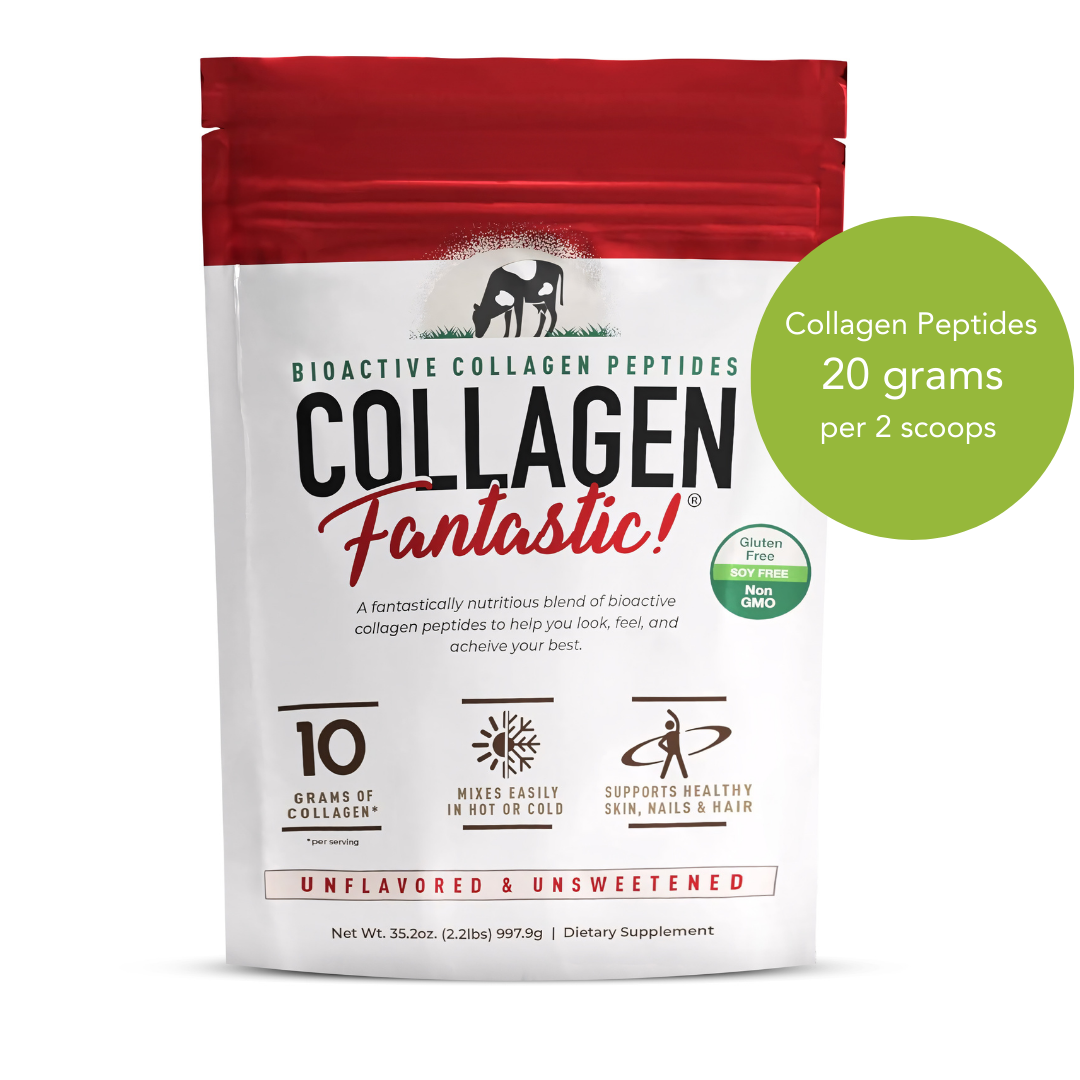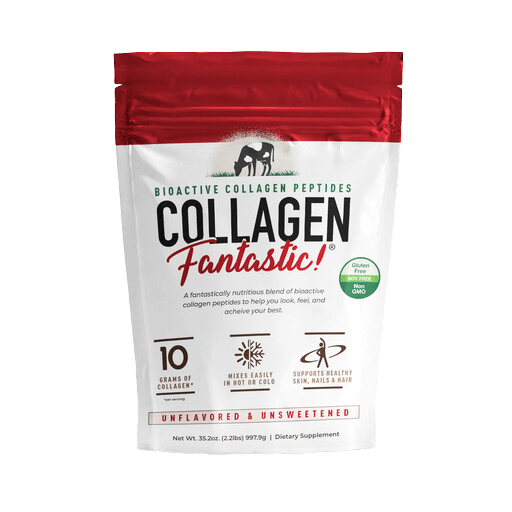Key Takeaways
-
Protein is the foundation of healthy aging, helping preserve muscle mass, balance hormones, and fuel metabolism.
-
Consistent protein intake supports cognitive function and energy, reducing age-related decline.
-
Clean protein sources like grass-fed whey and collagen promote long-term vitality without added fillers or chemicals.
Introduction
Longevity isn’t just about living longer—it’s about living better. Maintaining strength, clarity, and energy into your 50s, 60s, and beyond is one of the most powerful forms of self-care. And while there’s no magic supplement for eternal youth, one nutrient consistently stands out in longevity research: protein.
Protein plays a role in nearly every process that keeps your body functioning. It builds muscle, supports metabolism, maintains brain health, and repairs cells. Yet, many adults—especially older ones—don’t get enough of it.
At Fantastic Nutrition, we believe protein isn’t just for athletes; it’s the foundation of healthy aging. This article explores how protein fuels long-term wellness, why it becomes even more important with age, and how to choose the cleanest, most effective sources for lifelong vitality.
Why Protein Is So Important for Longevity
Every tissue in your body—from muscle fibers to neurotransmitters—is made of protein. As we age, our ability to synthesize and utilize protein decreases, meaning we need more of it to maintain what we already have.
Protein provides the amino acids your body uses to:
-
Build and preserve lean muscle.
-
Support metabolic health and energy.
-
Maintain cognitive function.
-
Repair tissues and support immune function.
Without enough protein, the body begins to break down muscle and tissue to meet basic needs, leading to frailty, slower metabolism, and even cognitive decline.
Ready to up your protein and take charge of your health? Try Whey Fantastic with 100% money back guarantee today. We know you'll love it!
The Link Between Protein and Muscle Health
Muscle is more than a symbol of fitness—it’s a vital organ for longevity. Strong muscles help maintain mobility, balance, and independence. Yet starting around age 30, adults lose 3–8% of muscle mass per decade, accelerating after 50.
This condition, known as sarcopenia, is one of the strongest predictors of frailty and loss of independence in older age. Fortunately, it’s preventable—and even reversible—with adequate protein intake and regular movement.
Protein stimulates muscle protein synthesis (MPS)—the process by which your body repairs and builds new muscle. Studies show that older adults often require higher amounts of protein per meal (around 25–35 grams) to trigger MPS compared to younger adults.
Grass-fed whey protein is one of the most efficient sources for this purpose due to its high leucine content, an amino acid that directly activates muscle repair.
Protein and Metabolism: Your Engine for Longevity
As metabolism slows with age, maintaining a healthy weight and energy level becomes harder. Protein plays a direct role in keeping metabolism active through several mechanisms:
-
Thermic Effect of Food: Protein requires more energy to digest than carbohydrates or fats, meaning your body burns more calories processing it.
-
Lean Mass Preservation: Muscle tissue burns more calories at rest than fat tissue, so maintaining muscle keeps your metabolic rate higher.
-
Blood Sugar Regulation: Protein helps stabilize glucose levels, reducing energy crashes and sugar cravings.
A higher-protein diet can help preserve muscle while managing weight, especially when paired with regular strength or resistance training.
Protein and Brain Health
The connection between protein and brain health is less talked about, but equally important. Proteins supply amino acids like tyrosine and tryptophan, which are used to make key neurotransmitters that regulate mood, focus, and motivation.
For example:
-
Tryptophan helps produce serotonin, influencing mood and sleep.
-
Tyrosine supports dopamine production, vital for motivation and attention.
-
Glutamine supports cognitive resilience under stress.
As we age, maintaining neurotransmitter balance becomes crucial for cognitive longevity. Consistent protein intake ensures the brain has what it needs to function at its best.
Protein, Hormones, and Recovery
Hormones play a major role in how we age. Protein helps regulate key hormones involved in metabolism, appetite, and stress response—such as insulin, ghrelin, and cortisol.
When protein intake is low, it can disrupt hormonal balance, leading to fatigue, poor recovery, and mood fluctuations. Conversely, adequate protein supports stable energy levels, better sleep quality, and faster tissue repair.
For women going through perimenopause or menopause, protein becomes even more vital as estrogen levels decline. Estrogen helps maintain muscle and bone, so higher protein intake can offset these changes and support healthy body composition.
The Role of Protein in Immune Health
A strong immune system is another cornerstone of longevity. Protein helps the body produce antibodies, immune cells, and enzymes that defend against illness and inflammation.
As we age, immune efficiency declines—a process known as immunosenescence. Studies show that diets higher in high-quality protein improve immune resilience, reducing the risk of infections and promoting faster recovery.
Whey protein is particularly rich in immune-supportive compounds like lactoferrin and immunoglobulins, making it an excellent addition for adults looking to stay healthy year-round.
Clean Protein: Quality Matters
All protein isn’t created equal. The source, processing method, and additives can make a huge difference in how your body responds.
Look for:
-
Grass-fed whey protein: Sourced from pasture-raised cows, rich in omega-3s and CLA.
-
Collagen peptides: To support joint and skin health alongside muscle.
-
Minimal ingredient lists: Avoid artificial sweeteners, gums, and fillers.
-
Transparent sourcing: Know where and how your protein is made.
At Fantastic Nutrition, we prioritize clean, grass-fed, and science-backed formulations to ensure your body gets what it needs—without unnecessary extras.
How Much Protein Do You Need for Longevity?
While the general RDA for protein is about 0.8 grams per kilogram of body weight, research on aging and longevity suggests that’s too low for optimal function. Most adults—especially those over 40—benefit from 1.2–2.0 grams per kilogram of body weight daily.
For example:
-
A 150-pound adult should aim for 80–130 grams of protein per day.
Distributing that intake evenly across meals improves absorption and utilization. Think 25–30 grams per meal, with an optional shake or snack between meals.
Timing Protein for Maximum Benefit
For longevity and energy, timing protein around your daily rhythm can make it even more effective:
-
Morning: Kickstarts metabolism and curbs cravings.
-
After exercise or activity: Replenishes muscles and speeds recovery.
-
Before bed: Supports overnight repair and muscle preservation.
Consistency is key—hitting your protein target every day has a cumulative effect that pays off over time.
Protein and Healthy Aging: Real-World Benefits
Older adults who meet higher protein goals experience:
-
Better strength and balance.
-
Faster recovery from illness or injury.
-
Healthier skin, nails, and connective tissue.
-
Improved focus and memory.
-
Enhanced quality of life and independence.
Longevity isn’t about avoiding aging—it’s about thriving through it, and protein is one of the simplest, most effective tools to help you do that.
Conclusion
Longevity starts at the cellular level. Every meal, every shake, and every choice contributes to how your body ages. Protein—especially from clean, nutrient-dense sources—supports the systems that matter most: your muscles, metabolism, brain, and immune health.
At Fantastic Nutrition, our mission is to help you age stronger, not slower. Whether you’re rebuilding after a workout, supporting your energy through a long day, or nourishing your body for the years ahead, quality protein is your most powerful ally.
Frequently Asked Questions (FAQs)
1. How much protein should older adults eat per day?
Most adults over 40 benefit from 1.2–2.0 grams of protein per kilogram of body weight daily. This supports muscle maintenance, metabolism, and immune health.
2. Can you get enough protein from food alone?
Yes, but many adults struggle to reach optimal intake through diet alone. Clean, high-quality protein powders can help fill nutritional gaps conveniently.
3. Does protein help with brain health?
Absolutely. Protein provides amino acids used to make neurotransmitters that influence mood, focus, and memory, supporting cognitive health as you age.
4. Is grass-fed protein really better?
Yes. Grass-fed protein powders often contain more omega-3s, CLA, and antioxidants, and come from cows raised without hormones or antibiotics. It’s cleaner, more sustainable, and more nutrient-rich.












